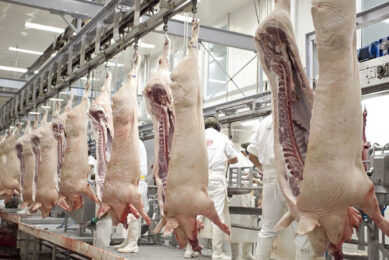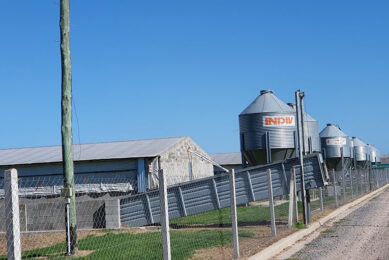British pig producers discuss current issues
Several key issues in UK pig industry were addressed last week at a meeting of the South of the Humber Pig Discussion Group, in Yorkshire, UK.
Regional HSBC agricultural adviser Michael Summers highlighted various problems: keeping good staff in the industry, smells created by pig units, effluent disposal and increased regulation (IPPC).
Summers reminded producers that the EU’s Common Agricultural Policy (CAP) will be gradually wound down and they would in his opinion have to manage risk better, without the CAP umbrella to shelter under. Hugh Burton is ABN’s national raw materials manager.
Raw materials
He highlighted the amazing volatility seen in the raw material price over the last 3-4 years, plus the ongoing cost variation, with the UK May 2009 wheat futures ranging from £95-£170 (€107-€192) per tonne.
Whilst harvests have improved, world raw material stockpiles are still very tight. Burton flagged up the current soya situation. Brazil, traditionally a big exporter, is now using large tonnages internally hence the EU is sourcing soya from Argentina, although the current political unrest there is impacting on the soya price.
Also drought conditions in Argentina pushed up soya prices but recent rains have put a floor in the market. Burton advised producers that they should spread their buying but if they are offered a feed price that locks in a profit , then they should go for it.
Slaughter prices
Phil Woodall is livestock director with ABN. He reminded the audience that, sadly, UK pig meat production had fallen by 25% over the last ten years. Five processors now handle 70% of the UK kill, plus the same five also produce 15% of the nation’s slaughter pigs. UK slaughter prices have been steadily rising and Woodall can see a price of £1.40 (€1.58) per kg deadweight for the next 6-12 months.
He does not see prices hitting £2 per kg (€2.26) though. The weak pound is helping the UK price, plus the Russian market has recently re-opened to Danish exports taking pressure off the UK market. British consumers are now also concerned about food miles and are wanting home produced product.
Welfare considerations are also fuelling demand for UK pigmeat over lower welfare imports. “Sadly there has not been the money in UK pigs to invest in decent modern buildings which could exploit the excellent genetics provided by UK breeding companies,” concluded Woodall.
Related websites:











